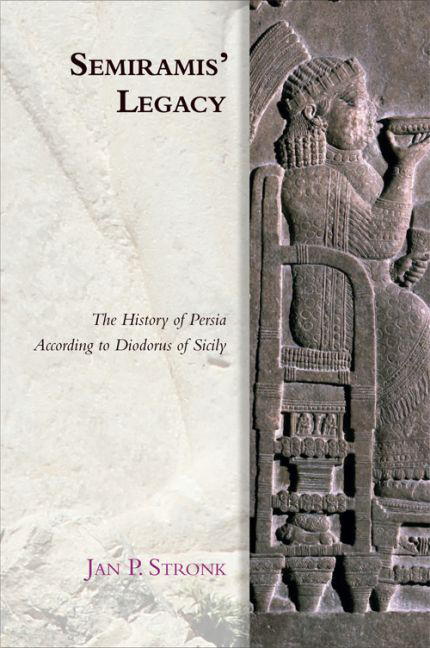Book contents
- Frontmatter
- Contents
- List of Figures and Tables
- Preface
- Abbreviations
- Series Editor's Preface
- Map
- Introduction: Diodorus' Work and Our Sources
- 1 Diodorus’ Sources
- 2 Ancient History: Assyrians, Chaldeans, and Medes
- 3 The Persians and the Greek Wars
- 4 Revolt and Sedition
- 5 Alexander the Great Defeats Darius III
- 6 From Persepolis to Babylon
- 7 The Period of the Diadochs: The Rift Opens
- 8 The Period of the Diadochs: The Rift Deepens
- 9 The Vicissitudes of the Diadoch Kingdoms: The Final Years of Diodorus' Persian Account
- 10 Semiramis' Legacy
- Conclusion
- Bibliography
- Index of Classical Sources
- Index of Modern Authors
- General Index
Introduction: Diodorus' Work and Our Sources
Published online by Cambridge University Press: 10 May 2017
- Frontmatter
- Contents
- List of Figures and Tables
- Preface
- Abbreviations
- Series Editor's Preface
- Map
- Introduction: Diodorus' Work and Our Sources
- 1 Diodorus’ Sources
- 2 Ancient History: Assyrians, Chaldeans, and Medes
- 3 The Persians and the Greek Wars
- 4 Revolt and Sedition
- 5 Alexander the Great Defeats Darius III
- 6 From Persepolis to Babylon
- 7 The Period of the Diadochs: The Rift Opens
- 8 The Period of the Diadochs: The Rift Deepens
- 9 The Vicissitudes of the Diadoch Kingdoms: The Final Years of Diodorus' Persian Account
- 10 Semiramis' Legacy
- Conclusion
- Bibliography
- Index of Classical Sources
- Index of Modern Authors
- General Index
Summary
INTRODUCTION
There are few detailed histories of Persia in ancient Greek historiography that have survived. Herodotus presents us with an account of the so-called Persian Wars and the periods before them, Ctesias wrote a much more comprehensive (and disputed!) account of Persian history down to about 390, unfortunately only fragmentarily preserved, while Arrian's (c. AD 90–c. AD 165) history of the expedition of Alexander the Great is, despite its date, as yet a main testimony for Alexander's period. Diodorus of Sicily, however, is the only author whose work has been, to some extent, transmitted to us to have written a comprehensive history (the Bιβλιοθήκη ἱστορική (Bibliotheca historica)) in which more than cursory attention is paid to Persia. Even though Diodorus’ work has not survived in its entirety, it nevertheless presents us with a view on Persia's development. The Bibliotheca (as we shall further refer to this work) covers the entire period from Persia's prehistory (in fact a history of Assyria, as it appears predominantly based upon Ctesias) until the arrival of the Parthians from the East and that of Roman power throughout Asia Minor and beyond from the West, some 750-odd years or more later. Diodorus’ contribution to our knowledge of Persian history is therefore, though again far from uncontested, as yet of great value for the modern historian of the ancient Near East.
Many, or even most, ancient authors were not primarily interested, let alone equipped, to provide us with accurate historical data as we would like to have them today (see Stronk 2014/15). They were, however, interested to provide their audience, one way or another, with their views of how societies worked, and, perhaps related thereto, with examples of proper conduct. For our purpose, these examples include, for example, tales of Persian expansion, effeminacy, depravity, and so on. Because most authors, at least from Herodotus onward, saw Assyrian, Median, and Achaemenid history – which may be stretched to 304 following the views of Depuydt (Depuydt 2008: 1,3) – and post-Achaemenid history as a continuous line, it was self-evident for these authors – and therefore also for Diodorus – that such examples could be found in each of these periods.
- Type
- Chapter
- Information
- Semiramis' LegacyThe History of Persia According to Diodorus of Sicily, pp. 1 - 30Publisher: Edinburgh University PressPrint publication year: 2017



